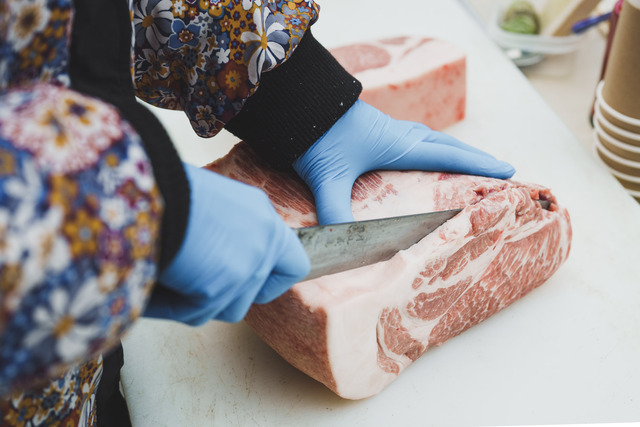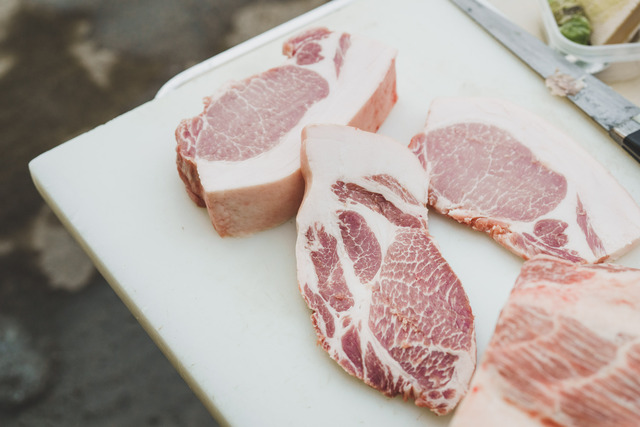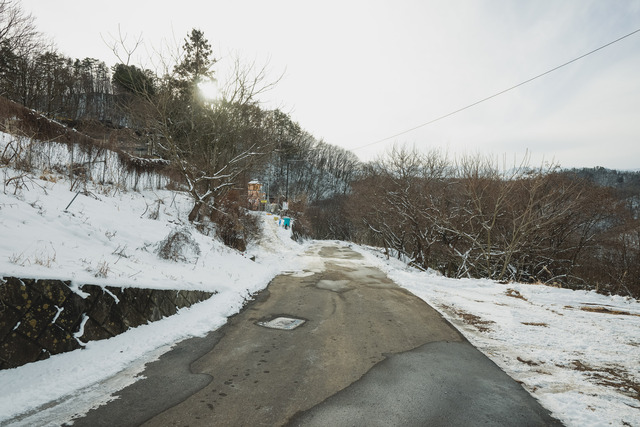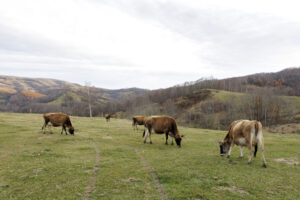Azumino Pastured Pork” Raised at 800-meter Elevation
A well-known meat wholesaler in Nagano Prefecture is eagerly awaiting the introduction of “Azumino Pastured Pork” raised in the mountains of Azumino City, central Nagano Prefecture, at an altitude of 800 meters. It is the ” Azumino Pastured Pork,” which is raised on pasture in the mountains 800 meters above sea level in Azumino City, central Nagano Prefecture.
The pig is raised by Hitoshi Fujiwara, the third generation owner of Fujiwara Chikusan. Fujiwara Chikusan has been focusing on pasture-raised pigs for three generations in this area.
Fujiwara Livestock Breeding has been focusing on pasture-raised pigs for three generations in this area. In order to produce pigs under the company’s brand name, dozens of different kinds of pigs were bred on a trial basis.
They arrived at the Sangenbuta pigs that were being raised in Niigata at the time. The main reason for choosing this breed was its ability to withstand the cold of winter, which is a major obstacle to grazing pigs in the highlands.
After the breed was selected, they went through a process of trial and error in order to maximize the benefits of the highlands for fattening the pigs. One of the ways is to create an environment in which the pigs themselves can live freely in the nature of the satoyama, finding a place where they feel comfortable and free to roam.
In order to ensure that the pigs are fattened up in a healthy manner, efforts have been made to secure sufficient pastureland so that they are not subjected to stress. The fermentation floor using bamboo chips, which was started as a way to make use of surplus local resources, is now indispensable. This fermented floor not only makes the barns more comfortable, but also contributes to the health maintenance of the pigs by providing them with an intestinal regulating effect. Mr. Fujiwara also says that it seems to be effective in producing non-sticky fatty meat.

Pastured Pork” was created through a process of trial and error.
Fujiwara Livestock Breeding’s Commitment
At Fujiwara Chikusan, pigs are fattened for 180 to 200 days, compared to the generally distributed pigs that are shipped from around 160 days of age. Although the longer fattening period is more costly, the meat is more resilient and tastier. This is another unique Fujiwara Chikusan commitment that was born out of a long period of trial and error.
Fujiwara Chikusan also pays attention to feed. The cattle are fed with a rich variety of local ingredients, including hops and malt scraps left over after the beer is squeezed at a local brewery, as well as apples, rice, soybeans, and other produce grown in Azumino. Of course, compound feed is the base of the diet, but by feeding locally grown seasonal ingredients in season, the cattle grow up healthy and in line with the natural cycle of nature, and their meat quality improves as well.
In addition, no antibiotics or hormones are administered to prevent diseases, which have been adopted by many livestock farmers in recent years. The pigs’ own immunity is enhanced by the near-natural environment and food they are fed, which is why these medications are not necessary.
Using Know-How to Update Flavor after Swine Fever Crisis
The pasture-raised pigs were progressing smoothly, but in 2019, when Jin became the company’s representative, the situation suddenly changed.
Nagano Prefecture was hit by swine fever. After pigs infected with swine fever were confirmed at the prefectural livestock experiment station in Shiojiri City, wild boars infected with swine fever were discovered in a mountain forest about 3 km away, and all of the more than 300 pigs being raised at related facilities were slaughtered.
A sow breeder in Niigata, with whom he had been in contact for 30 years, suddenly suspended business with him because of the spread of swine fever in the prefecture. The situation was so devastating that everything they had accumulated up to that point was reduced to zero, but the crisis was saved by a pig farmer in Tateshina. The farmer gave the company a hybrid pork crossed with Duroc, and the company managed to resume pasture-raised pigs. At first, they lost quite a few pigs due to the cold weather and the indigenous bacteria of the pigs that had previously been raised in their barns, but by 2020, with the input of experts, they had established a breeding method that enabled them to maintain a stable supply. Many people say that the new Azumino pastured pork tastes better than the old one, and the company has succeeded in updating the taste while making full use of the experience and know-how accumulated over three generations.

What are the characteristics of Fujiwara Chikusan’s Azumino pastured pork?
Over a long period of time, Fujiwara Chikusan has produced healthy, tasty, and high quality pigs by maintaining an environment as close to nature as possible while paying particular attention to feed and fattening methods.
Azumino pastured pork does not have a distinctive odor or unpleasant taste, and its meat is fine and firm in texture. The healthy, stress-free meat has a thin fat content and can be distributed as is without shaping after butchering. Moreover, the meat is sweet and chewy like wild game, and has a light aftertaste, making it highly valued even by those who do not like fatty meat. The fat has a low melting point due to the exercise and sun exposure provided by pasturage, so it does not cause stomach upset when eaten, and it also produces almost no lye when cooked.
It is no wonder that pork with such high potential has many fans among professionals and amateurs alike, but what further enhances its reliability is its production control system. In addition to thorough production history management, the company has installed new equipment to prevent CSF (swine fever) infection, and has implemented thorough hygiene management in its barns and pastureland.

Bringing Pasture-Farmed Swine to the Nation
The Azumino pastured pigs raised in the mountains of Azumino with as much care and attention as possible have been highly acclaimed not only by but also by butchers and renowned chefs in and outside of the prefecture, and are now being sold by a well-known organic supermarket chain.
Fujiwara feels that the appeal of pasture-raised pigs is steadily spreading throughout Japan, albeit gradually. Although the land is not wide open, he continues to pursue the possibilities of pasturage in the highlands, making the most of the advantages of being in the mountains.




